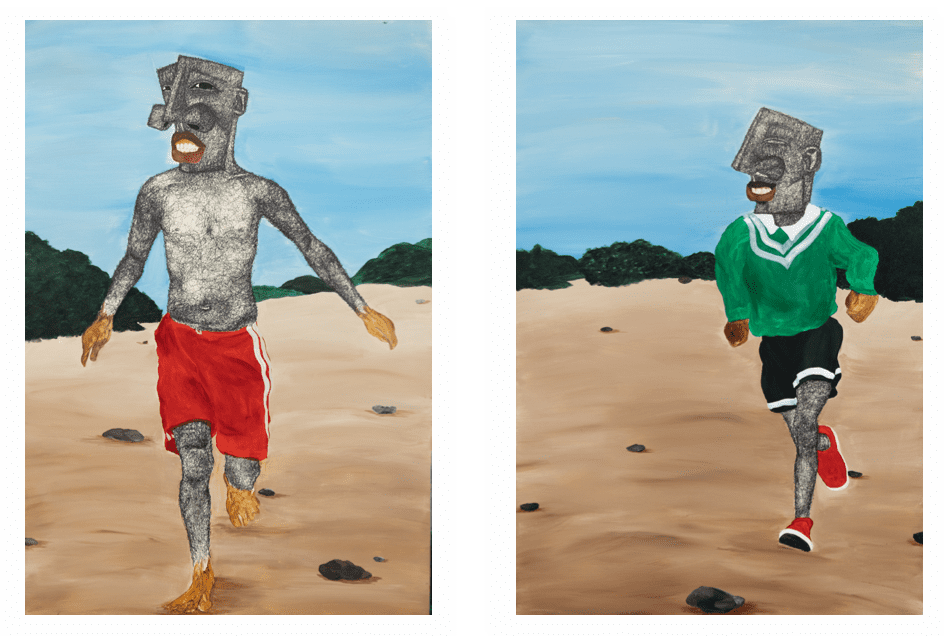African Artists’ Foundation, Lagos, Nigeria
01 May 2022 - 04 Jun 2022

Western canons often present art and science as existing in completely independent spheres of inquiry; but in African epistemology, there is a seamless exchange of ideas between both aspects. Memories are not stored whole in any one cell, but distributed in fragments through networks of neurons, this means new pieces can be added for context throughout a lifetime making anyone event an evolving thought-form. That is to say, in any one lifetime, a single event will live many lives as experiences recolour the memory with context that brings new truths, feelings, and meaning to the reels of our lives. It is how the once banal become nostalgic and even pain can be transmuted to fondness.
For many artists, the COVID years have been a period of isolation characterized by time distortion, due to the collapse of most regular time trackers like the neighbours heading out for work, the trash truck collecting daily waste, school children heading off to/from school in noisy groups and other signs of a passing day. The neurons keep the score, and they are distributed throughout the body waiting to be triggered at any moment by as little as the scent of a perfume or an old song on the radio. The result, a strange feeling of amnesia as time becomes more and more difficult to pin down with a painful repetition of life becoming the dominant memetic reference frame. How do you add context when nothing seems to be changing over time? How do you even create new memories, when a world in standstill won’t provide the events for new neural pathways to emerge?
For the artist, Ayanfe Olarinde, Now I Know Why Birds Fly represents growing through knowing, but not a knowing that could be read in books or any other means practised in isolation. The knowing here speaks to learning from life itself via a language, its most fluent language, time and experience spoken by the entire body.
Reeling off the forced year of introspection, Olarinde approaches the reopening of the wider world with a sense of thirst as if to drink up every drop of time for fear of waste. This psychological disposition resulted not just in a hunger to feel more, but also, to be more conscious and reflective of these feelings, and so this collection was born. As the world gains back its pre-pandemic momentum, Now I Know Why Birds Fly serves as a journal of youthful reemergence with its tongue on the stream of life. It is a journal of recollections painted with the surreal signature motif of the artist’s mind trying to make tangible the mental and visceral taste of life fleeting in time as it moves from one moment to the next. Here, Olarinde employs different modes of expression, to convey varying layers of her lived experiences during a time when reality was a box, juxtaposed against the easing up of isolation birthing a new freedom to be. In this collection, a kaleidoscope of intimacy, vulnerability, loss, and euphoria are not just explored experiences – but also an ode to beauty in the aesthetic and resonance in the symbology.
In time, the memories preserved in these works of art might well take on a new life in the artist’s mind, but that will never mean the death of the old in the way we do not lose an old self upon every new discovery in our lifetime. Instead, it is a gift of freedom which allows us to create and recreate, labouring beyond the constraints.
In the new world, with the freedom of a new reality and so much of the world to see and experience, the tenacity to journal again and to give the self to a wider variety of growth experiences has never been more crucial.
Born in 1996, Ayanfe Olarinde is a visual artist who employs scribbling techniques as well as photography in creating intricately detailed and multi- layered images. In 2018, she graduated from the University of Lagos with a BSc in Microbiology.
In her work, Olarinde explores and drives conversation around self-image, identity formation, social reality, collective history and mental health while probing popular culture and the inefficiencies of the government in contemporary society. Drawing from imperfections in her personal, continuous journey for acceptance, Olarinde’s engagement with the scribbling technique serves as a way to interrogate emotion while also exploring fluidity in form.
Curated by Princess Ayoola.